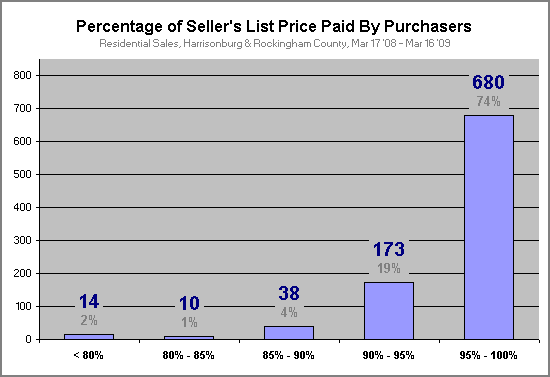| Newer Posts |
How much can I negotiate off of a home's asking price? |
|
Over the past year in Harrisonburg and Rockingham County, 93% of all homes sold have sold within 10% of the seller's asking price.  Given this market data, keep the following things in mind as you are considering making an offer on a home, or as you are considering pricing your home to sell:
Happy negotiating! | |
Determining an offering price in today's market |
|
 In making an offer to purchase a home, there are many small and large decisions to make (closing date, home inspection, closing cost credit, etc) --- but the decision that often has a 30-year impact is the offering price. A few short years ago (2003/2004), most buyers were offering at or very close to the asking price, as homes were "flying off the shelf" they were selling so fast. These days you'll typically have a bit more time to consider your offering price, which should include thoughts and discussions about... 1. Recent Sales Perhaps the most important of all factors, at what price have comparable homes recently sold? You likely won't want to pay too much more that the price for which other buyers have recently paid for similar properties. This is often much easier thought than analyzed, as there are many homes where it is difficult to find directly comparable home sales. 2. Competing Properties For Sale It is also important to reflect on the price you would pay if you bought an alternative house that is also for sale and that is reasonably similar to the house you are actually considering purchasing. If an owner is asking $250K for their home, even if other homes have recently sold around $250K, it would be important to know if three other comparable homes are currently for sale for $205K. 3. Seller's Acquisition Cost This information is not always available, and is not always pertinent, but it can guide conversations about an offering price. If two owners are both trying to sell their homes for $250K, and one bought their home for $150K and the other bought their home for $220K, the price you might offer on one house would be quite different than the second. Again, this is not always pertinent, as most owners won't want to sell their home at a price that they perceive to be under market value just because they can based on what they paid for it originally. 4. Length of Time on the Market Again, this won't always make an impact on the price that you will have to pay to purchase a particular home, but the owner of a home on the market for a week would see an offer of 85% of the asking price very differently than the owner of a home that has been on the market for two years. 5. Your Finances Perhaps the most important factor, you must make an offer at a price that is comfortable for you when it comes to the associated monthly housing costs. Sometimes this means making an offer which you suspect will not be accepted, but some financial/budgetary rationale must be inserted into the conversation at this point. There are many other ways to look at the asking price as you determine the offering price --- and indeed, each home sale scenario is different, so beyond this quick guide, determining the offering price warrants an in depth conversation. | |
What are the chances that I will sell your home? |
|
 What are the chances that your Realtor (a.k.a. "listing agent") will also represent the buyer of your home? Or, put another way, what are the chances that the agent you hire to sell your home will be the one who actually sells it (represents the buyer)? In 2008, there was a 1 in 4 chance that your listing agent would be the one to sell your home. Of the 1,371 residential properties that sold in Harrisonburg and Rockingham County in 2008, there were 342 transactions (25%) where the seller was represented by the same agent as the buyer. Statistics aside, however, this brings up the controversial issue of "dual agency" -- a practice in which the same agent represents both the buyer and seller. Dual agency is commonly practiced (as we saw above, in 1 out of 4 transactions), but it is something that I typically try to avoid. (Less than 5% of my transactions involve dual agency.) A dual agent is significantly limited in how they can represent the buyer and seller in a transaction because they are representing both parties. It would be akin, in some ways, to one attorney representing both the plaintiff and the defendant. There are plenty of times when this works out just fine, and an agent is able to fairly represent both the buyer and seller in a transaction, but there are plenty of opportunities for problems as well. Generally, the only exception that I make for practicing dual agency is when I have a pre-existing buyer client who decides they want to purchase a property where I am already representing the seller. (I'm in the midst of one of these transactions now.) Any thoughts here? Is the 25% stat (of properties being sold by the listing agent) surprising high or surprisingly low? Does dual agency seem perfectly acceptable, or remarkably absurd? | |
Offering to buy, or offering for sale, which comes first!? |
|
 So you want or need to buy a new house, but you must sell your current house before you can close on the new one. Do you wait to try to sell your house until you have a contract on a new house, or do you wait to make an offer on a new house until you have a contract on your current house? This is a bit of a puzzling question in the current market, and two of my clients are currently wrestling with this enigma. Option 1 - offer to buy first
| |
Jump out there and make the offer! |
|
 Home sales are slow which means that buyers will likely be able to negotiate on the price of the home they hope to purchase. All of my clients that have ears know this, and thus I often find myself answering the question of "how much do you think we could negotiate on the price?" I always have some thoughts on how much we may be able to negotiate, often influenced by:
| |
How close are buyers coming to the asking price? |
|
 One issue that often seems to be on a buyer's mind these days is the question of how much they should be able to negotiate off of an asking price for a house. Let's take a look at closings from the past 30 days to provide some insight into what buyers are actually accomplishing right now in the market. Examining all residential sales in Harrisonburg and Rockingham County (10/17/2008 - 11/16/2008) we find...
| |
Go For The Gold: How to compete and win as a home buyer |
|
Are all buyers created equal? Certainly not --- especially from a seller's perspective in our current market.  Here's how I would rank buyers, from the most exciting to sellers (#1) to the least (#9)...
The good news is that you can (sometimes) take steps to move up this list:
| |
Seller: "C'mon -- do your job -- convince those buyers to buy!" |
|
 If only it were that easy! If only it were that easy!When I am representing a homeowner in the sale of their property, I am:
The reality is that I often don't have that opportunity! Most buyers these days are working with a Realtor and thus have someone representing their interests. I can talk the ear off of their Realtor to try to convince them of the merits of the house that their client has viewed, but I don't have the ability to directly affect the buyers' decision making. Alas, in a market where sales are much slower than previous years, most homeowners really wish that I (or their Realtor) could make that connection with the potential buyers --- and somehow, somehow, convince them to buy! | |
We have been trying to sell our home FOREVER!!! |
|
A lot of people feel this way right now --- that they have been trying to sell their home for many months (or longer) without success. This situation is mainly a numbers game ---- closings are down 23% this year, and new listings are up 43%. Clearly, there are many more sellers in the market than there are buyers, which creates the impatience for selling. To put your situation in perspective, let's break down the listings that are currently for sale in Harrisonburg and Rockingham County: This information is showing how many months these sets of properties have been on the market without having sold: On the market for 0 - 6 months = 656 properties On the market for 6 - 12 months = 208 properties On the market for 12 - 18 months = 66 properties On the market for 18 - 24 months = 20 properties On the market for 24 + months = 8 properties (yikes!) If your house as been on the market for a few months without having been sold, don't despair --- it is just taking a bit longer for these properties to sell. | |
Is there a price at which you would buy this home? |
|
Back in February '08, I wrote about buyer and seller perspectives on our real estate market, and pointed out that many buyers are bashful right now. They will look at quite a few houses, and find one or two that they like, or really like, or can't live without --------- and then, they will decide not to make an offer on the property. Why, you might ask, would a buyer decide not to make an offer on a house they want to purchase? Most often, it is because they think the asking price is too high, they aren't sure whether they will be able to negotiate it down, and thus they don't want to anger the seller or embarrass themselves by making too low of an offer. I'm here to tell you --- make the offer! I have seen several offers work out very well for buyers over the past few months --- because the buyers stepped up to the plate and made an offer that they thought was reasonable for the house in question. As we are evaluating properties, if a buyer seems to really like a house, but doesn't particularly care for the price, I ask the question... is there a price at which you would buy this home? If there is, let's make an offer and see where we can go from there! | |
Housing Supply & Demand - May 2008 |
|
This is an illustration of the relationship between our market's supplyand demand in four price ranges. The numbers (6, 11, 14, 25) representthe months of supply of properties currently available based on averagedemand per month during the past twelve months.  This month (May 2008) shows an increase in months supply in all except the lowest price range. The most significant increase was in the $400k+ price range where the months of supply available jumped from 21 months to 25 months. This was largely because of the increased supply of homes --- 152 homes for sale in May as opposed to only 137 in April. | |
Change Is Here . . . We Must Adapt! |
|
Slower Home Sales . . . Fewer Mortgage Options . . . Appreciation Remains, But . . . | |
Do Buyer Incentives Encourage A Sale? |
|
 Many sellers think so.....but I rarely meet buyers who think so. Many sellers think so.....but I rarely meet buyers who think so.You have likely heard of incentives that sellers offer buyers, such as:
But wait --- all such logic goes out the window given the negotiation process! For instance, it is quite possible that when presented with an offer, the seller of the house without free trash service might come off of their price by $8,000, while the seller of the house with free trash service might not negotiate at all. As becomes clear --- the existence of a buyer incentive does not at all guarantee a better opportunity for the buyer --- and buyers know this! Additionally, buyers can ask for and attempt to negotiate any term they so desire in a contract. If you want free trash service from a seller who isn't offering it --- ask! If you want closing costs from a seller who isn't offering them --- ask! I rarely find a buyer who is bashful to include such concessions in an offer, even if it is not being advertised by the seller as being possible. Thus, the non-existence of a buyer incentive doesn't mean that the concession won't happen --- and buyers know this! A few final notes . . .
| |
One Year Builder's Warranty on New Construction |
|
 As you consider buying a newly constructed home, it is important to be aware of what is often referred to as a one-year builder warranty. As you consider buying a newly constructed home, it is important to be aware of what is often referred to as a one-year builder warranty. Technically, what we are referring to are "Implied warranties on new homes" per Virginia statute 55-70.1. What is covered by the warranty? The builder warrants that the "dwelling with all its fixtures is, to the best of the actual knowledge of the vendor or his agents, sufficiently (i) free from structural defects, so as to pass without objection in the trade, and (ii) constructed in a workmanlike manner, so as to pass without objection in the trade." Essentially, no structural defects, and workmanlike construction. When does the one year start? The earlier of when the title is transferred, or when the buyer takes possession of the property. I bought a house three months ago and have discovered structural defects. The builder is telling me a warranty doesn't exist, because "as is" was written into the contract. Is this possible? It is possible to modify or exclude the Virginia statute based implied warranty. However --- it is likely that the builder did not follow the statute when selling the property to you as is. To sell a new property "as is" and exclude the implied home warranty, the fact that the house is being sold "as is" must be written on the face of the contract, in capital letters, in a font size at least two points larger than the other type in the contract. This doesn't happen too often. I have a structural issue, what do I do? The statute specifies that you have a cause of action against the builder, but that you must first notify the builder of the defect and allow them a reasonable period of time (no longer than six months) to cure the defect. What about the foundation? The foundation is warrantied for five years (instead of just one) --- though if a foundation issue exists, it must be reported to the builder within two years of when it is discovered. The Virginia statute keeps referring to a "structural defect" --- what is that? Per the code, "a defect or defects that reduce the stability or safety of the structure below accepted standards or that restrict the normal use thereof." Yes, that is about as vague as you can get. My builder is asking me to sign a warranty document at closing --- why? And should I sign it? First, take time to read the document. In most cases, such a document includes verbiage that limits the (vague) rights you would have had under the broad Virginia statute. Builders ask buyers to sign these documents to narrow the scope of buyer's possible warranty requests --- and this desire often comes from past buyers who have been unreasonable in asking the builder to address cosmetic (or other non-structural) issues within the first year. If the document only includes language that restricts or eliminates your rights under the broad Virginia statute, kindly refuse to sign the document. Unless all parties agreed in the sales contract that a warranty document would be signed at closing, the builder can not require you to sign the document --- it is imposing a new contract term on the buyer, when that was not included in the original negotiations. One caveat --- sometimes the document serves both the builder and the buyer --- it can do so by specifically stating items that the builder will indeed repair that might otherwise be in a gray area given the vague nature of the Virginia statute. | |
Buy Now, Save Big (sometimes) |
|
 In two out of my most recent three closings, my buyer clients bought at a fantastic price --- below appraised value. In two out of my most recent three closings, my buyer clients bought at a fantastic price --- below appraised value. Scenario #1 --- buyers offered a quick closing, with no home sale contingency, and paid $13,000 under the appraised value. Scenario #2 --- buyers bought from a relocation company, and paid $10,000 under the appraised value. Why is it happening? In both cases, the buyers made aggressive offers --- instead of opting not to make an offer based on a higher than reasonable asking price. As I noted a few weeks ago, buyers currently seem to be hesitating to make offers, and sellers are hesitating to lower their prices. For the buyer who is willing to negotiate, this means there are opportunities to buy at great prices! | |
Who Pays The Closing Costs? |
|
 Some buyers make offers including a condition that the seller pay all or some of the closing costs. Some buyers make offers including a condition that the seller pay all or some of the closing costs.Some sellers offer the incentive of seller-paid closing costs to try to entice buyers. What's really going on here? There are a few ways to look at it:
| |
Inspecting the Home Inspection Process |
|
 The first thing to know about the home inspection process is that it is a process for the benefit of the buyer. However, the standard contingency form and negotiation document typically used in our market are balanced documents that respect the needs and priorities of both the buyer and seller. The first thing to know about the home inspection process is that it is a process for the benefit of the buyer. However, the standard contingency form and negotiation document typically used in our market are balanced documents that respect the needs and priorities of both the buyer and seller.The Context When making an offer on a property, a buyer negotiates the price and other terms based on their understanding of the property at the time of the offer. However, often buyers will include a home inspection contingency to allow themselves an opportunity to learn more about the property with the help of a professional home inspector. Thus, if a buyer negotiates a contract on a house that has two broken windows, it would not be reasonable to try to negotiate for the repair of the windows during the home inspection process, since that fact was already known about the house --- but if a leaky sink is discovered, it would be perfectly reasonable to request that repair. The Substance The standard inspection contingency references a long list of areas for inspection, including: geotechnical inspections, inspections of the structure, foundations, roof, flooring, HVAC systems, electrical system, plumbing system, appliances, exterior insulation finishing systems, drainage, windows, well and septic systems, and lead-based paint and radon. Yet at the same time, the inspection contingency specifies that the buyer may only request the repair of "material defects" which is described as "those items that could affect the decision of a reasonable person to purchase the Property" and would not include "cosmetic items, matters of preference, or grandfathered systems or features that are properly functioning but would not comply with current building codes if constructed or installed today." The Flow Post-inspection, a buyer may provide the seller with a list of requested repairs. The seller would then respond by offering any of the following:
The Problems Potential pitfalls during the inspection and re-negotiation process include:
| |
Harrisonburg Homes - True List to Sell Ratios |
|
A statistic that can be very helpful in understanding the state of the real estate market is the ratio between the list price and sale price of a home. For example, 216 single family homes sold thus far in 2007 (1/1/2007 - 12/30/2007), with an average list to sell ratio of 97.81%. This means that Sellers are getting, on average, 97.81% of their asking price - - - or are they?? When I (or any other Realtor) runs these calculations in the MLS, the statistical analysis compares the sale price to the final list price, not the original list price. Unfortunately, comparing the sale price to the original list price is a manual process. But let's see what it would show us . . . Because of the tedious nature of this research, I have limited this to Harrisonburg single family homes that sold in the 4th quarter (9/1/2007 - 12/30/2007). There were 39 homes, that sold at 97.24% of the final list price. When looking at the sale price compared to the original list price, the ratio drops to . . . . . . . . . . 94.20%. Interestingly, of the 39 homes, 8 of them sold for less than 90% of the original list price. Let's put a few of these numbers in perspective, with the lowest ratios in the set . . . 977 Summit Avenue Original List Price = $498,000 Final List Price = $424,900 Sale Price = $375,000 (75% of original list price) 740 Collicello Street Original List Price = $150,000 Final List Price = $145,000 Sale Price = $125,000 (83% of original list price) 60 Shenandoah Avenue Original List Price = $182,500 Final List Price = $169,900 Sale Price = $156,000 (85% of original list price) A few interesting take away points:
| |
Harrisonburg High-End Real Estate Market |
|||||||||||||||||||||||||||||
Each month I run the same series of calculations to determine how supply and demand relate in several price ranges --- less than $200k, $200k - $350k, and $350k and up. At the start of December, there were 20 months of supply of homes priced $350,000 and up. One of my readers posed the question of whether there might be more of a story to tell in what could be a very large price range --- $350k and up encompasses many hundreds of thousands of dollars. So, let's take a look --- please note, I updated the "Available" numbers to reflect current availability.
So --- it is somewhat interesting --- there are only 17 months of homes priced between $350k and $600k --- and a whopping 61 months of homes available priced above $600k. But to give the $600k+ homes a fair shake, let's make sure September, October and November weren't unusually low sales months. From January 2007 through November 2007 (inclusive), there were 16 sales of homes above $600k. This is 1.45 sales per month --- which would make the current inventory (43 homes) equivalent to 30 months of supply. Better than 61 months --- but this is still the most oversupplied price range by far! | |||||||||||||||||||||||||||||
Negotiations: Speed vs. Enforceability |
|
 Negotiating a contract can take place verbally, or in writing -- there are advantages and disadvantages of each strategy. Negotiating a contract can take place verbally, or in writing -- there are advantages and disadvantages of each strategy. Almost always, the (prospective) buyer makes the first move in negotiations -- I suggest that it takes place in written form. A buyer can certainly make a verbal offer on a property, but putting the offer in writing has several benefits:
When it comes to further negotiating the terms of a contract -- after the offer has been made -- oftentimes it can be more helpful to do so verbally. A few things to consider:
| |
| Newer Posts |
Scott Rogers
Funkhouser Real
Estate Group
540-578-0102
scott@funkhousergroup.com
Licensed in the
Commonwealth of Virginia
Home Search
Housing Market Report
Harrisonburg Townhouses
Walk Through This Home
Investment Properties
Harrisonburg Foreclosures
Property Transfers
New Listings

 There are quite a few local and national changes occurring right now that greatly affect buyers and sellers. Let's contemplate how we must prepare and adjust.
There are quite a few local and national changes occurring right now that greatly affect buyers and sellers. Let's contemplate how we must prepare and adjust. 